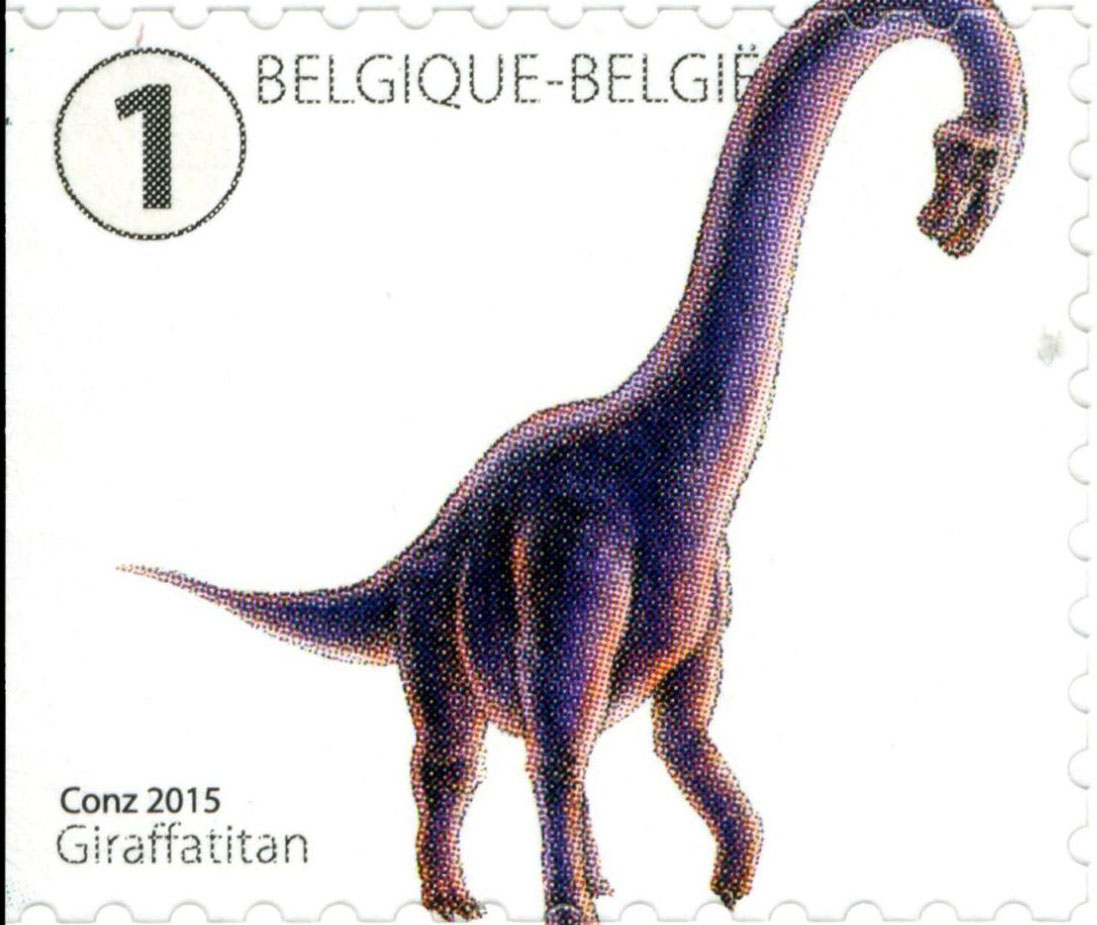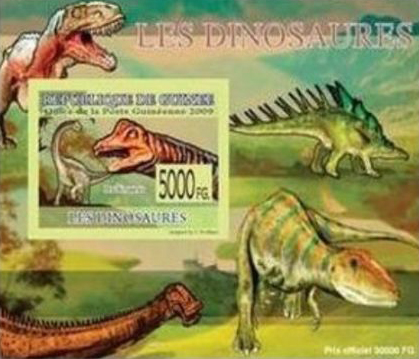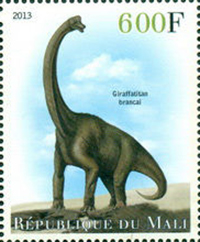Giraffatitan brancai Janensch, 1914

(Da: it.wikipedia.org)
Phylum: Chordata Haeckel, 1874
Subphylum: Vertebrata Cuvier, 1812
Classe: Dinosauria Owen, 1841
Ordine: Saurischia Seeley, 1887
Famiglia: Brachiosauridae Riggs, 1904
Genere: Giraffatitan Paul, 1988
Descrizione
Raggiungeva una lunghezza di 23 m e un'altezza di 12, per un peso totale di circa 50 tonnellate. Altre ossa suggeriscono che possano essere esistiti esemplari ben più grandi con stime di oltre 30 metri di lunghezza, più di 15 di altezza e 100 tonnellate di peso, misure simili a quelle del Sauroposeidon. Come tutti i brachiosauridi, aveva un collo lunghissimo e un aspetto vagamente pendente dato dal fatto che le zampe anteriori erano più lunghe di quelle posteriori. Alcuni paleontologi ritengono che sia, a tutti gli effetti, un sottogenere del più famoso brachiosauro. La famosa ricostruzione del brachiosauro con la testa dotata di un elmo in realtà si basa su un teschio appartenente a un Giraffatitan.
Diffusione
Vissuto in Tanzania nel Giurassico superiore.
Sinonimi
Sinonimo del genere: = Abdallahsaurus (nomen nudum) = Blancocerosaurus (nomen nudum) = Ligomasaurus (nomen nudum) = Mtapaisaurus (nomen nudum) = Salimosaurus (nomen nudum) = Wangonisaurus (nomen nudum). Sinonimo della specie: = Brachiosaurus brancai Janensch, 1914 = Brachiosaurus fraasi Janensch, 1914.
Bibliografia
-Janensch, W. (1914). "Übersicht über der Wirbeltierfauna der Tendaguru-Schichten nebst einer kurzen Charakterisierung der neu aufgeführten Arten von Sauropoden". Archiv für Biontologie. 3 (1): 81-110.
-Molina-Perez & Larramendi (2020). Dinosaur Facts and Figures: The Sauropods and Other Sauropodomorphs. New Jersey: Princeton University Press. p. 259.
-Tamborini, Marco & Mareike Vennen (2017) Disruptions and changing habits: The case of the Tendaguru expedition, Museum History Journal, 10:2, 183-199.
-Heinrich, Wolf-Dieter (1999). "The Taphonomy of Dinosaurs from the Upper Jurassic of Tendaguru (Tanzania) Based on Field Sketches of the German Tendaguru Expedition (1909-1913)". Mitteilungen aus dem Museum für Naturkunde in Berlin, Geowissenschaftliche Reihe. 2: 25-61.
-Taylor, M.P. (2009). "A Re-evaluation of Brachiosaurus altithorax Riggs 1903 (Dinosauria, Sauropod) and its generic separation from Giraffatitan brancai (Janensch 1914)" (PDF). Journal of Vertebrate Paleontology. 29 (3): 787-806.
Paul, G.S. (1988). "The brachiosaur giants of the Morrison and Tendaguru with a description of a new subgenus, Giraffatitan, and a comparison of the world's largest dinosaurs" (PDF). Hunteria. 2 (3): 1-14.
Olshevsky, G. (1991). "A revision of the parainfraclass Archosauria Cope, 1869, excluding the advanced Crocodylia" (PDF). Mesozoic Meanderings. 2: 1-196.
-Chure, D.; Britt, B.; Whitlock, J. A.; Wilson, J. A. (2010). "First complete sauropod dinosaur skull from the Cretaceous of the Americas and the evolution of sauropod dentition". Naturwissenschaften. 97 (4): 379-391.
-Mannion, P. D.; Upchurch, Paul; Barnes, Rosie N.; Mateus, Octávio (2013). "Osteology of the Late Jurassic Portuguese sauropod dinosaur Lusotitan atalaiensis (Macronaria) and the evolutionary history of basal titanosauriforms" (PDF). Zoological Journal of the Linnean Society. 168: 98-206.
-Mazzetta, G.V.; et al. (2004). "Giants and Bizarres: Body Size of Some Southern South American Cretaceous Dinosaurs". Historical Biology. 16 (2-4): 1-13.
-Janensch, W. (1950). "The Skeleton Reconstruction of Brachiosaurus brancai" (PDF). Palaeontographica: 97-103.
-Colbert, E. (1962). "The weights of dinosaurs". American Museum Novitates (2076): 1-16.
-Russell, D.; Béland, P.; McIntosh, J.S. (1980). "Paleoecology of the dinosaurs of Tendaguru (Tanzania)". Mémoires de la Société Géologique de France. 59: 169-175.
-Anderson, J.F.; Hall-Martin, A.; Russell, D.A. (1985). "Long-bone circumference and weight in mammals, birds and dinosaurs". Journal of Zoology. 207 (1): 53-61.
-Alexander, Robert McNeill (1985). "Mechanics of posture and gait of some large dinosaurs". Zoological Journal of the Linnean Society. 83 (1): 1-25.
-Peczkis, J. (1995). "Implications of body-mass estimates for dinosaurs". Journal of Vertebrate Paleontology. 14 (4): 520-533.
-Gunga, H.-C.; Kirsch, K.A.; Baartz, F.; Röcker, L.; Heinrich, W.-D.; Lisowski, W.; Wiedemann, A.; Albertz, J. (1995). "New data on the dimensions of Brachiosaurus brancai and their physiological implications". Naturwissenschaften. 82 (4): 190-192.
-Gunga, H.-C.; Suthau, T.; Bellmann, A.; Stoinski, S.; Friedrich, A.; Trippel, T.; Kirsch, K.; Hellwich, O. (2008). "A new body mass estimation of Brachiosaurus brancai Janensch, 1914 mounted and exhibited at the Museum of Natural History (Berlin, Germany)". Fossil Record. 11 (1): 33-38.
-Henderson, D.M. (2004). "Tipsy Punters: Sauropod Dinosaur Pneumaticity, Buoyancy and Aquatic Habits". Proceedings: Biological Sciences. 271 (Supplement 4): 180-183.
-Benson, R. B. J.; Campione, N. S. E.; Carrano, M. T.; Mannion, P. D.; Sullivan, C.; Upchurch, P.; Evans, D. C. (2014). "Rates of Dinosaur Body Mass Evolution Indicate 170 Million Years of Sustained Ecological Innovation on the Avian Stem Lineage". PLOS Biology. 12 (5): e1001853.
-Holtz, Thomas R. Jr. (2008) Dinosaurs: The Most Complete, Up-to-Date Encyclopedia for Dinosaur Lovers of All Ages Supplementary Information.
-Paul, Gregory S. (2016). The Princeton Field Guide to Dinosaurs. Princeton University Press. p. 227.
-Witmer, L.M. (2001). "Nostril position in dinosaurs and other vertebrates and its significance for nasal function" (PDF). Science. 293 (5531): 850-853.

|
Data: 07/09/2015
Emissione: Dinosauri Stato: Belgium |
|---|

|
Data: 25/02/2009
Emissione: Animali preistorici Stato: Guinea |
|---|

|
Data: 01/01/2013
Emissione: Il mondo preistorico Stato: Mali |
|---|